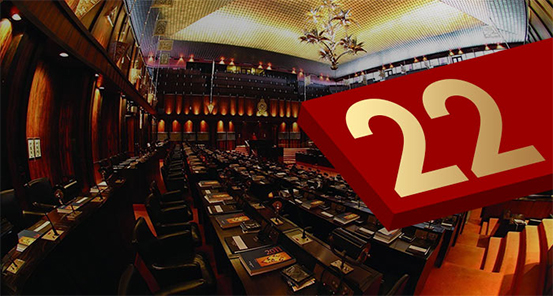The 22nd Amendment to the Constitution will be presented to the Parliament by Minister of Justice, Prisons Affairs and Constitutional Reforms Wijeyadasa Rajapakshe this morning (Aug 10).
Parliamentary session commenced at 10.00 a.m. today and will continue until 4.30 p.m.
The amendment, which had been referred to as the 21st Amendment so far, will in fact be the 22nd Amendment, as another draft 21st Amendment has already been gazetted.
The 21st Amendment to the Constitution is the constitutional amendment presented to the parliament by the main opposition Samagi Jana Balawegaya (SJB) in April as a private Bill. It was later published in the government gazette and challenged in the Supreme Court.
Dr. Wijeyadasa Rajapakshe, who was appointed the Minister of Justice, Prison Affairs & Constitutional Reforms, later presented a government Bill to the Cabinet of Ministers in his ministerial capacity, which is referred to as the 22nd amendment.
The Supreme Court, delivering its determination, ruled that the 21st amendment put forward by the SJB cannot proceed further without a public referendum.
In such a backdrop, the Cabinet of Ministers gave the approval to gazette the 22nd amendment presented by the Justice Minister.
Policy approval of the Cabinet of Ministers was given on June 20, 2022 for the preliminary draft for the 22nd amendment. The 22nd constitutional amendment bill was prepared by the legal Draftsman accordingly. The Attorney General had later informed that the bill is in accordance with the Constitution.
Consequently, the Cabinet of Ministers approved the proposal presented by the Minister of Justice, Prison Affairs and Constitutional Reforms, to publish the 22nd constitutional amendment Bill in the Government Gazette and thereafter present the same in Parliament for approval.
The constitutional amendment is expected to empower Parliament over the executive president and annul the 20A to the Constitution, which had given unfettered powers to President after abolishing the 19th Amendment.
Under the 22A, the President, the Cabinet of Ministers and the National Council will be held accountable to the Parliament. Fifteen Committees and Oversight Committees are also accountable to Parliament.


